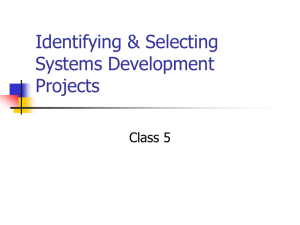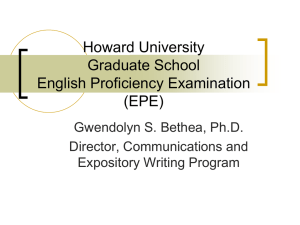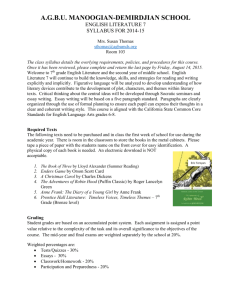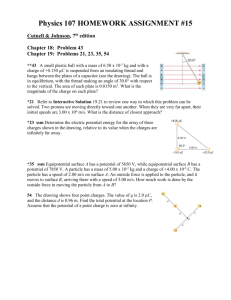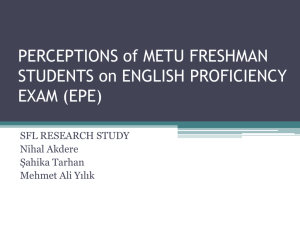EPE 301 Education In American Culture
advertisement
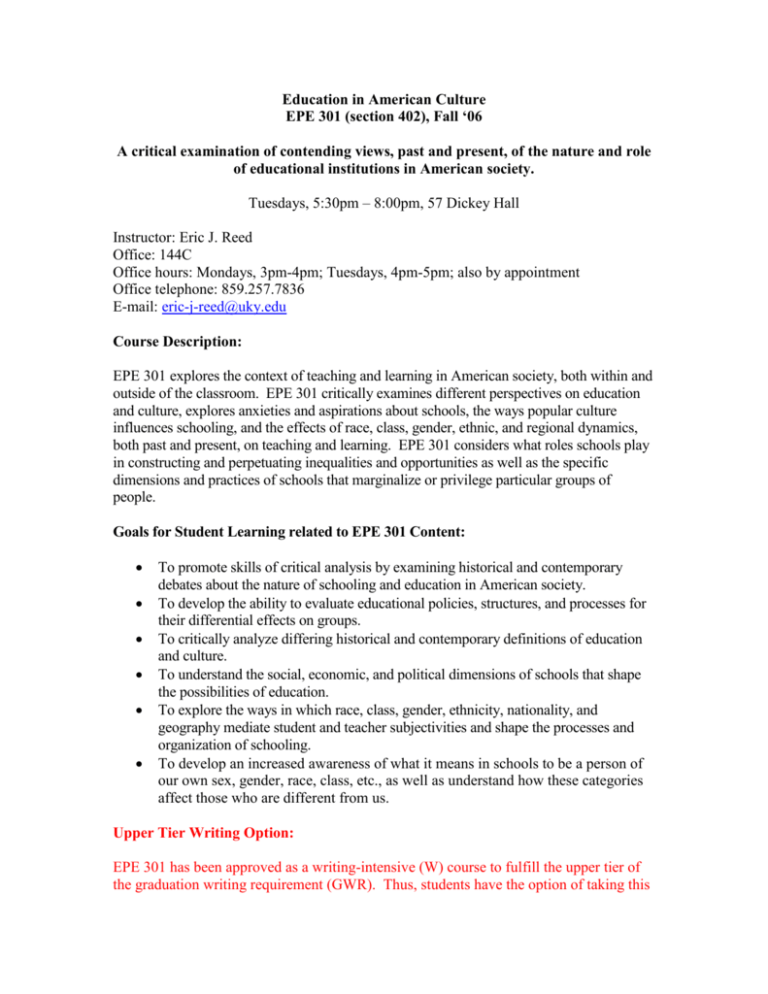
Education in American Culture EPE 301 (section 402), Fall ‘06 A critical examination of contending views, past and present, of the nature and role of educational institutions in American society. Tuesdays, 5:30pm – 8:00pm, 57 Dickey Hall Instructor: Eric J. Reed Office: 144C Office hours: Mondays, 3pm-4pm; Tuesdays, 4pm-5pm; also by appointment Office telephone: 859.257.7836 E-mail: eric-j-reed@uky.edu Course Description: EPE 301 explores the context of teaching and learning in American society, both within and outside of the classroom. EPE 301 critically examines different perspectives on education and culture, explores anxieties and aspirations about schools, the ways popular culture influences schooling, and the effects of race, class, gender, ethnic, and regional dynamics, both past and present, on teaching and learning. EPE 301 considers what roles schools play in constructing and perpetuating inequalities and opportunities as well as the specific dimensions and practices of schools that marginalize or privilege particular groups of people. Goals for Student Learning related to EPE 301 Content: To promote skills of critical analysis by examining historical and contemporary debates about the nature of schooling and education in American society. To develop the ability to evaluate educational policies, structures, and processes for their differential effects on groups. To critically analyze differing historical and contemporary definitions of education and culture. To understand the social, economic, and political dimensions of schools that shape the possibilities of education. To explore the ways in which race, class, gender, ethnicity, nationality, and geography mediate student and teacher subjectivities and shape the processes and organization of schooling. To develop an increased awareness of what it means in schools to be a person of our own sex, gender, race, class, etc., as well as understand how these categories affect those who are different from us. Upper Tier Writing Option: EPE 301 has been approved as a writing-intensive (W) course to fulfill the upper tier of the graduation writing requirement (GWR). Thus, students have the option of taking this Reed, EPE 301 (section 402) Course Syllabus, Fall ‘06 2 course as a W course. In order to receive W credit for this course, you must have successfully completed the first-year writing requirement (ENG 104 or its equivalent) and have completed at least 30 hours of coursework. Learning Outcomes related to the Upper Tier Writing Option: Write a paper that is essentially free of mechanical errors (grammar, punctuation, spelling, and syntax) and awkwardness, using a style that is appropriate to the purpose and audience. Demonstrate an ability to discover, evaluate, and clearly present evidence in support of an argument in a subject area and utilize documentation that conforms to the formats and the citation conventions of that subject area. Be aware that composing a successful text takes multiple drafts, with varying degrees of focus on generating, revising, editing, and proofreading. Write a capable, interesting essay about a complex issue (discipline-specific) for a general university audience. Questions about the W option should be referred to the Director of the UK Writing Initiative, Professor Janet Carey Eldred, eldred@uky.edu. Required Texts: Beals, M. P. (1994). Warriors don't cry: A searing memoir of the battle to integrate Little Rock's central high. New York: Washington Square Press. Kozol, J. (1991). Savage inequalities: Children in America's schools. New York: Harper Perennial. Stevens, E., Jr., Wood, G. H., & Sheehan, J. J. (2000). Justice, ideology, & education: An introduction to the social foundations of education (4th Ed.). New York: McGraw Hill. Additional required reading materials will be provided and made available to you via reserve services. Noteworthy Policies: Accommodations Please contact me as soon as possible if you require or can be better served by courserelated accommodations. Attendance Unless you have what the University of Kentucky considers a legitimate reason, you are required to attend every class meeting. If you sleep during a class meeting you will be counted as absent. If you use any personal wireless devices during class or have a personal wireless device that rings, beeps, or vibrates during class you will be asked to leave and counted as absent for that meeting. Reed, EPE 301 (section 402) Course Syllabus, Fall ‘06 3 For every two times you are late to class (without informing me of your tardiness prior to class) you will be counted as absent once. If you have more than 1 unexcused absence the highest grade you can earn is a B. If you have more than 2 unexcused absences the highest grade you can earn is a C. If you have more than 3 unexcused absences before the end of the semester you will earn a failing grade for this course (unless, of course, you withdraw). The UK’s stated definitions of excused and unexcused absences can be viewed online at: www.uky.edu/StudentAffairs/Code/part2.html Grading and Assessment I will provide you with a grading rubric for each course requirement. Final letter grades will be calculated with the following 100-point scale: 90-100: 80-89: 70-79: 60-69: Below 60: A B C D E Grading and Assessment Policies related to the Upper Tier Writing Option: To pass the course, students must submit all formal writing assignments (in draft and final form) and earn a grade of C or higher on each. Any major assignment (in final form) that earns a D or below must be revised to reflect competency and resubmitted. You may resubmit such assignments once. If you fail to earn a C grade on the final version of any major writing assignment, you will earn a failing grade for the course. Assignments other than the formal writing assignments enter into the final grade determination only if the student has earned grades of C or higher on the formal writing assignments. At the discretion of the instructor, students who fail to achieve competency may receive incomplete grades, but in no case may a student whose writing fails to reach the level of C (competent) earn a passing grade in a course that satisfies the University Writing Requirement. Please submit two copies of your final paper. I will grade one copy, and one copy will be used for SACS assessment. One of the two copies of your final paper should be a clean copy, with only your social security number listed at the top of the page and all other identifying information (your name, instructor name, and course and section number) removed. Plagiarism Part II of UK’s Student Rights and Responsibilities states that academic work, written or otherwise, submitted by students to their instructors or other academic supervisors, is expected to be the result of their own thought, research, or self-expression. In cases Reed, EPE 301 (section 402) Course Syllabus, Fall ‘06 4 where students feel unsure about a question of plagiarism involving their work, they are obliged to consult their instructors on the matter before submission. When students submit work purporting to be their own, but which in any way borrows ideas, organization, wording or anything else from another source without appropriate acknowledgment of the fact, the students are guilty of plagiarism. Plagiarism includes reproducing someone else’s work, whether it be published article, chapter of a book, a paper from a friend or some file, or whatever. Plagiarism also includes the practice of employing or allowing another person to alter or revise the work which a student submits as his/her own, whoever that other person may be. Students may discuss assignments among themselves or with an instructor or tutor, but when the actual work is done, it must be done by the student, and the student alone. When a student’s assignment involves research in outside sources or information, the student must carefully acknowledge exactly what, where and how he/she has employed them. If the words of someone else are used, the student must put quotation marks around the passage in question and add an appropriate indication of its origin. Making simple changes to another person’s work while leaving the organization, content and phraseology of that work intact constitutes plagiarism. However, nothing in these Rules shall apply to those ideas which are so generally and freely circulated as to be a part of the public domain (Section 6.3.1). The minimum penalty for an academic offense, such as cheating or plagiarism, is an E in the course (Section 6.4.1). Part II of UK’s Student Rights and Responsibilities can be viewed in its entirety online at: www.uky.edu/StudentAffairs/Code/part2.html Course Requirements*: Participation (15 points, or 7½ points per half-semester): You are required to actively participate in discussions and do so in a manner that demonstrates a thoughtful reflection of the subject-matter. You are required to be respectful, supportive, and challenging to your colleagues. Reaction Papers (20 points, or 2 points per paper): You are required to write ten one or two-page reaction papers. Reaction papers should: briefly summarize the reading for that week; describe the connections you make between the reading and your prior knowledge and experiences; summarize what you consider the strengths and weaknesses of the reading; and include at least two questions you have regarding the reading. Article Presentation (10 points): You are required to present one research article to our class during the course of the semester. Your presentation should last between fifteen and twenty minutes, and in that time you should: describe the article’s research question and results; discuss what you believe are the personal, professional, and/or policy-based implications of the article’s results; and try to answer any questions your peers have about the article. In the first Reed, EPE 301 (section 402) Course Syllabus, Fall ‘06 5 weeks of class you will select the article you wish to present to class, and I will provide you with that article. During our second class meeting I will present an article to class so that you better understand this requirement. Exams & Pop Quizzes (10 points): Exams will be discussed at length during the first weeks of the semester. Pop quizzes will be employed at my discretion. Analytic Essays - (20 points, or 10 points per essay): Essay #1 - Diversity, Difference, and Privilege in Schools You are to conduct two in-depth interviews with persons different from yourself about their educational experiences. The four to five page essay discussing these interviews should consider how race, class, nationality/region, and/or sex/gender are interwoven into these persons' educational experiences and expectations. You will be expected to use concepts and readings covered in class to inform your interviews and analysis. Essay #2 – Public Goods & Private Goods Using the framework outlines in David Labaree’s article “Public goods, private goods: The American struggle over educational goals” you are to examine a contemporary issue in American education. The accompanying four to five page essay should: describe Labaree’s thesis and the framework he uses to support his thesis; thoroughly describe various aspects and views of the issue you select; and incorporate the issue you select into Labaree’s framework. Field-Based Inquiry Project (25 points): A field experience placement of 15 hours is required for all EPE 301 students. This is an inquiry-based, active learning experience, designed to enhance your foundation of knowledge and experience. The placement project should be relevant to you, your professional goals, and the issues covered in this course. Related to this field experience you are required to complete the following tasks: Journal (5 points): Your journal should include a detailed description of your activities and observations during your field placement, as well as a signed time log. Field Project Report (20 points): Using historical, interview, participantobservation, and/or document policy analysis, you need to analyze the educational dynamics in your field placement. This essay is an exploration of your field placement in relation to the concepts and perspectives addressed in this course. Your analysis should integrate course readings and discussion as well as include at least two refereed journal articles not assigned in class. Either way, the final paper, seven to eight pages in length, should provide a clear, concise report of Reed, EPE 301 (section 402) Course Syllabus, Fall ‘06 6 what you have learned and how learning occurred, as well as incorporate applicable course readings and additional literature. *All written assignments should have 1” margins, be double-spaced, and be in New Times Roman font with a 12 point font size. Written assignments longer than one page should include page numbers. Final drafts of written assignments should document references with the APA 5th style. Unless you receive approval from me, you are required to submit paper-&-ink copies (also known as hard copies) of your written assignments on or before the dates they are due. Excluding reaction papers, which I do not accept after they are due, I deduct one point per day for each day a written assignment is late. You are required to either submit your work directly to me or leave it in my EPE mailbox. You are required to submit working drafts of your field project report and analytic essays. I will provide you with written feedback on the working draft of your field project report, and in-class peer workshops will be employed to help you revise your analytic essays. UK offers a variety of programs and activities that can help you improve your writing and revising skills outside of class. We will discuss many of these programs and activities at length during the first weeks of class.
